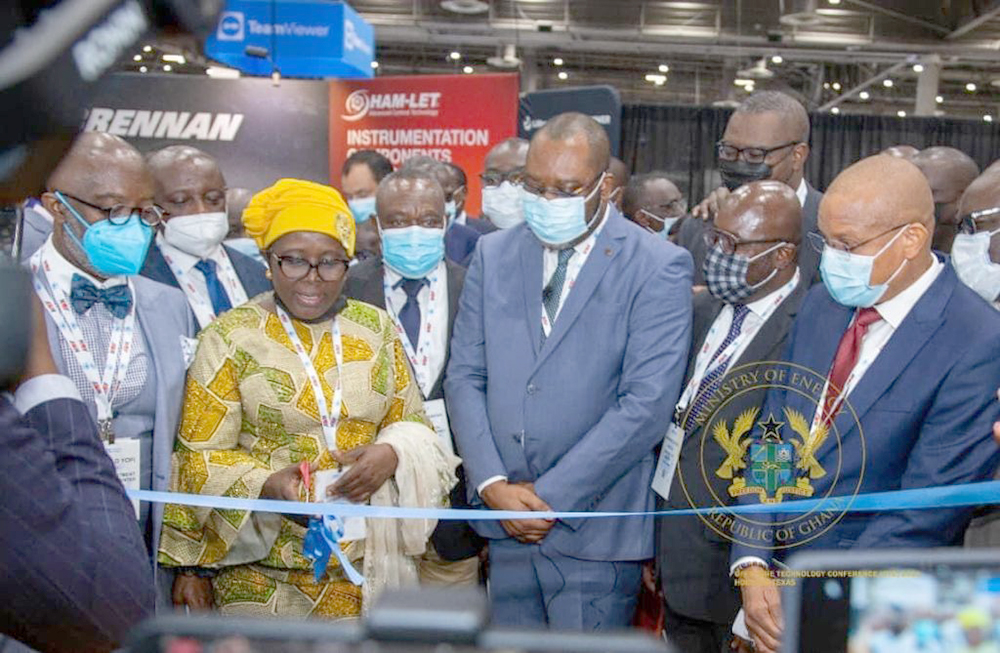The Minister of Energy, Dr Mathew Opoku-Prempeh, has told international players in the global oil and gas industry about the government’s resolve to become a hub of refined petroleum products in the West African sub-region and beyond by the year 2030.
The hub, he said, involved the development of infrastructure such as refineries, port terminal facilities, storage facilities, petrochemical plants as well as Liquefied Natural Gas (LNG) terminals with a network of pipelines.
“In addition, it is within our plans to develop Compressed Natural Gas (CNG) facilities to serve as alternative sources of fuel for transportation”, he said last Monday when he formally opened the Ghana pavilion at the Offshore Technology Conference (OTC) currently ongoing in Houston, Taxes.
“CNG is a cheaper and cleaner fuel than the other fossil sources and its use is in line with our broader goal transition progressively from the carbon-intensive sources to low carbon sources of energy”, he told the packed crowd of investors who thronged the pavilion to know more about Ghana’s prospects in the petrochemical industry.
Cleaner energy
As the world looks towards cleaner energy for the future, he said the global advocacy for energy transition and cleaner energy “is not lost on us in Africa”.
Dr Opoku-Prempeh said: “Indeed, Ghana remains committed to its SDG 7 goals and has been working towards clean energy in its energy mix through several initiatives and policies.”
He, however, noted that the fact remains that gas, especially Africa’s Liquefied Natural Gas (LNG), was the cleanest of fossil fuel and harnessing it to power generators could make a huge impact on the drive to accelerate universal coverage. According to him, without a clear and purposeful drive towards cheaper electricity through gas exploration, Ghana’s goal of universal coverage and industrialisation would make little or no impact.
He added: “We cannot, therefore, take oil and gas exploration out of our conversation towards a sustainable future and our aim of eliminating energy poverty, since our needs and priorities are vastly different from those of industrialised countries as we are at a different stage of our growth process. Ghana, and by extension the rest of oil producing Africa, must be allowed to grow her renewable mix at her own rate while using her natural resources to power her economy and eliminate energy poverty could be counter-productive and further widen the economic gap between the North and the South.”
Dr Opoku-Prempeh said Ghana sought more, not less exploration, “which is why it takes this event particularly seriously and continues to push for inwards investment in the country’s oil and gas industry.”
Ribbon cutting
Explaining the rationale for the ribbon cutting, he said “the ribbon is to present and showcase Ghana’s pavilion at the OTC, to demonstrate to the world that truly our petroleum industry is awash with exciting investment opportunities. We are here not only to tell the world about our flourishing upstream Industry but also create awareness of opportunities in our downstream Industry.
Award of licences
The Energy Minister said in the upstream space, Ghana had a lot of untapped hydrocarbon resources, both offshore and onshore, which it hoped to sustainably explore and exploit through partnerships with private companies.
“In Ghana, Exploration and Production (E&P) licences are awarded through open, transparent and competitive public tender processes. However, E&P licences may be awarded through direct negotiations without public tender if direct negotiations represent the most efficient manner to achieve optimal exploration, development and production of petroleum resources in a defined area. Either way, prospective contractors must have the requisite technical and financial abilities to undertake petroleum activities,” he stated.
Dr Opoku-Prempeh said there were also farm-in opportunities in some of the existing licences for prospective investors to operate through existing petroleum agreements without having to go through block application and negotiation processes.
He said Ghana’s sedimentary basins were de-risked and highly prospective “and our petroleum industry is regulated by clear, predictable and suitable fiscal, legal and regulatory regimes. In addition to these, the congenial business atmosphere, the hospitality of the Ghanaian people and more importantly our relative political stability should make every investor consider Ghana as an investment destination.”
The Special Advisor and Partner to the McDan Group, Mr Benji Kwesi Tackie, said the group was aligned with government’s vision to support local companies and support the drive for foreign direct investment.
He expressed thanks to the Houston Ghana Chamber of Commerce, which has been the major brain behind the oragnisation, and expressed the hope that the event would inure to the growth of the sector.
Dignitaries
Present at the ceremony were Ghana’s Ambassador to the United States of America, Hajia Alima Mahama; Chief Executive Officer of the Ghana Investment Promotion Centre (GIPC), Mr Yofi Grant; Chief Executive Officer of Bulk Oil and Transportation (BOST), Mr Edwin Provencal; Chief Executive of the Petroleum Commission, Mr Egbert Faibille; the Executive Director of the American Chamber of Commerce (AMCHAM) Ghana, Mr Simon Madjie, among many others from the upstream and downstream petroleum sector.
